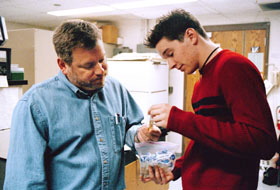|
This is an archived article. For
the latest news, go to the Advance Homepage
For more archives, go to the Advance Archive/Search Page. |
||
|
Mentoring Program Helps
Teens
Make Research Connection By Janice Palmer
"It was an awesome experience!" said an enthusiastic Ian Spain, as he relived his two-week adventure for Renzulli and Vieth. "I was having such an incredible time, I considered misplacing my passport." Their relationship began last summer when Spain, a 16-year-old Bethel High School student, attended the UConn Mentor Connection. The three-week summer program pairs high school juniors and seniors with University faculty and staff as mentors. It is funded in part by a grant from the Connecticut State Department of Education and a significant endowment gift from UConn trustee William Berkley. Spain, who describes himself as an underachiever, often bored with school, chose the biotechnology site. He was one of five students under the tutelage of Vieth, who has volunteered for the program for six years. From the beginning, Vieth saw something special in Spain: "Ian is quite a remarkable individual. He is intelligent, and though he may not be the most academically accomplished of all the students I've mentored, Ian has the whole package. He is outgoing, enthusiastic, highly self-motivated, and he's a pleasure to be around." Vieth assigned the teen to a project led by Francisca Massardo, a post-doctoral fellow investigating why hummingbirds in Chile seem to be consuming insects along with their usual diet of flower nectar. Using a high-performance liquid chromatography machine, Spain was taught to identify the type and amounts of sugar in nectar collected from South American flowers. Vieth's support of the teenager did not end with the summer program. Some months later, Vieth mentioned to Renzulli that he wished he could send Spain on a field trip to further the teen's research experience and reinforce his passion for science. Vieth says Renzulli did not hesitate for a second before saying, "Let's do it." And with budget shuffling and some juggling, the prominent educator, who believes "learning should be fun," came up with the needed funds.
"This was such an important thing for Ian, and if it means I won't be making a trip or two this year, then so be it," says Renzulli. "He's everything we look for in a talented student, and I'm very fond of him because he wants to make the world a better place." Spain's trip began with a 20-hour plane ride from Hartford to Dallas, then to Santiago, Chile, where he boarded a small plane for Puerto Williams, the southern tip of the country. A ferry ride delivered Spain to his final destination, Omora Ethnobotanical Park, where he met up with Massardo. Spain says they camped, hiked, and ate berries and mushrooms like the indigenous people. He collected flower nectar and climbed trees to retrieve fungus for another of Massardo's projects. The UConn scientist is trying to determine the diet of the local Indians. There are just two full-blooded members left and they are both in their 70s. Spain, who'd had just a basic Spanish course four years ago, said by the end of his visit, he was able to communicate very easily with the local people. "They were so interesting. I learned a lot about them and about the beautiful place they live in that is disappearing because of development," he said. "This experience changed my life, and I am so thankful that Joe made this trip possible for me. I can't wait to go back!" The high school junior says he is more focused on his future than ever before. He can't wait for college. His first choice? UConn - a response Vieth and Renzulli were happy to hear. Spain will be back in Vieth's lab throughout the spring and summer to catalogue and analyze the samples he brought back, and to put together a Power Point presentation about his trip. |
 t's not every day that educators see the
effect they have had on a student. But Bob Vieth, a
research scientist at the Biotechnology Center, and
Joe Renzulli, director of the Neag Center for
Gifted Education and Talent Development, shared
that experience last month, when they welcomed home
a teenager they had sent on a research trip to
Chile.
t's not every day that educators see the
effect they have had on a student. But Bob Vieth, a
research scientist at the Biotechnology Center, and
Joe Renzulli, director of the Neag Center for
Gifted Education and Talent Development, shared
that experience last month, when they welcomed home
a teenager they had sent on a research trip to
Chile.
